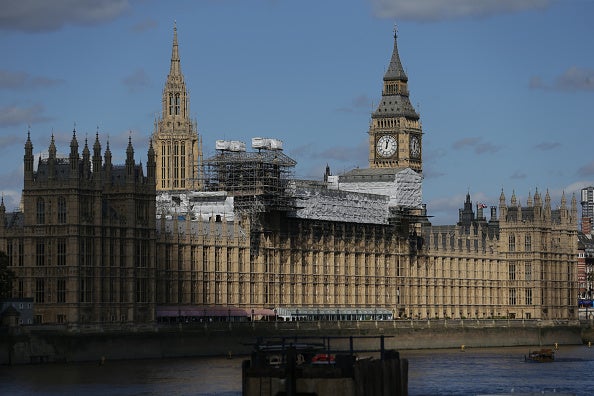Theresa May could still block proposed £4bn revamp of Parliament, MPs claim is needed to avoid 'catastrophic' event
Downing Street indicated the Prime Minister will study plans before coming to a decision

Theresa May could still block plans for a £4 billion renovation of Parliament which MPs claim is needed to avoid a "catastrophic event".
The committee recommending the move was forced to deny it is a “vanity project” following claims it could end up costing far more and is a bad use of public money.
Mrs May’s office said the Prime Minister would have to study proposals put forward by the committee before making any decision.
Concerns were also raised over whether the UK labour market had enough skilled workers to undertake the substantial project.
The Joint Committee on the Palace of Westminster, made up of Lords and MPs, produced a report saying the most cost effective, quickest and lowest risk option for carrying out the restoration of Parliament was to move all MPs, Peers and staff out for eight years.
It said it was essential works be carried out on the ageing mechanical and electrical services buried inside the building, which pose a major fire risk.
After a report suggested Mrs May backed the move, Downing Street clarified saying: "The PM's view is that we should carefully consider the proposals and will want to hear the views of MPs before deciding on the direction.
"We will need to look at the way forward in discussion with Parliament."
A study by Deloitte last year highlighted appalling conditions at the Palace, with potentially deadly fire risks, collapsing roofs, crumbling walls, leaking pipes and large quantities of asbestos.
There was one incident where raw sewage poured from pipes on to workers’ desks, leaving them in need of inoculations.
The committee rejected more expensive options of trying to carry out repair work without leaving the building.
There was even an option to relocate Parliament on to huge floating platforms on the River Thames.
The "full decant" option, with both Houses moving out temporarily, was estimated by Deloitte to cost between £3 billion and £4.3 billion, with the most likely figure being around £3.5 billion and could take between five and eight years.
The committee’s report said the Palace of Westminster “faces an impending crisis which we cannot responsibly ignore.”
It added: "It is impossible to say when this will happen, but there is a substantial and growing risk of either a single, catastrophic event, such as a major fire, or a succession of incremental failures in essential systems which would lead to Parliament no longer being able to occupy the Palace."
SNP MP Alex Salmond accused the committee of “asking taxpayers to pay a Westminster premium to crowbar a modern parliament into a Victorian building at a time of austerity”.
But Labour committee member Chris Bryant said: "This is certainly not a vanity project of any kind."
He argued that the committee did not want to "spend a single penny more than necessary" but the Palace is a "part of our national heritage".
Former Lords leader Lady Stowell said: "I expect the Government to take its lead from Parliament. What I think is perfectly reasonable is for the Government to stand back and wait for Parliament to express its view on what is a national building and then give its view."
The Royal Institute of British Architects had warned the MPs there is a "great skills shortage" that could impact on the scheme.
The committee acknowledged the concerns but claimed it would be a chance to boost apprenticeship schemes and small, specialist firms across the UK.
Join our commenting forum
Join thought-provoking conversations, follow other Independent readers and see their replies
Comments
Bookmark popover
Removed from bookmarks